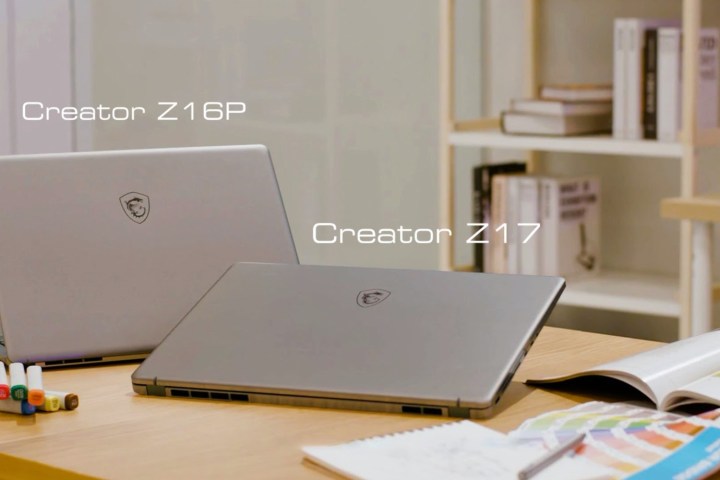MSI’s Creator Z16 was always meant to be a true MacBook Pro competitor, and at CES 2022, it has been upgraded to be an even stronger rival.
The MSI Creator Z16, launched in 2021, was MSI at a laptop for content creators — those who need a laptop with more performance than your average ultrabook. It came with an 11th-gen Intel H-series processor and an RTX 3060.

But in 2022, MSI is releasing the Z16P, a version that not only bumps the processor up to Intel’s 12th-gen with up to 14 cores but also pushes performance on the graphics front. Nvidia’s new RTX 3070 Ti and 3080 Ti are both optional upgrades with the MSI Creator Z16P.
That represents more than just a generational step up. That’s offering a significant amount more graphics performance than in the previous model. The Creator Z16 was already an impressively powerful laptop, especially in tasks like video editing.
Along with the improved components, you’ll also find an upgraded thermal system. In addition to the two fans, you now have a vapor chamber cooler, which MSI says provides 65% more airflow and cooler surface temperatures (by two degrees Celsius).
That increase in power does come at a change in size. The Creator Z16P is 0.75 inches thick, while the standard Z16 is just 0.63 inches thick. That brings it in as thicker than the 0.66-inch, MacBook Pro.
The Creator Z16P is also considerably heavier, at 5.3 pounds, compared to the 4.9 pounds of the original.
The other change is in the screen. It’s still a 2560 x 1600 resolution across configurations, but now it comes with a higher refresh rate, up to 165Hz from 120Hz.
Both the Creator Z16P and Z17 use a “True Pixel” display, which MSI claims to hit up to 1,000 nits of brightness and 100% of the DCI-P3 color space.
Above the display, you’ll also find an upgraded webcam, now sporting a 1080p resolution.
Other than that, however, the Creator Z16P looks nearly identical to the Z16. It still has a dark silver chassis, a per-key RGB keyboard, and a reflective MSI logo on the lid.
Impressively, it’s all still powered by USB-C, now with a larger 240-watt power adapter. The Creator Z16P does, smartly, swap out the mini-SD card slot with a full-sized one.
The Creator Z16P starts at $2,999, which is a Core i7 with an RTX 3070 Ti, 16GB of RAM, and 1TB of storage. You can pay up to $4,399 if you want the RTX 3080 Ti model with 64GB of RAM and 2TB of storage.
MSI also announced a slightly large 17-inch model, the Creator Z17. Again, it looks nearly identical to the Z16 and Z16P — it’s even the same 0.75 inches thick. The Creator Z17 even comes with the same processor, graphics options, screen resolution as the Z16P.

Interestingly, the vapor chamber cooling is only available in the Creator Z16P model. The Z17 relies on a more traditional three fans and five heat pipes instead.
The Creator Z17 also has a slightly different port selection. It comes with an HDMI port, as well as a proprietary power connector.
The MSI Creator Z17 costs $250 more for the base configuration ($3,249) but also starts with 32GB of RAM.
MSI also announced a number of new gaming laptops, which use a new “phase-changing” liquid metal cooling system.
Editors' Recommendations
- CES 2023: The Zenbook Pro 16X is looking like a serious MacBook Pro alternative
- ThinkPad debuts its ‘progressive’ new design with Z13 and Z16 laptops
- MSI’s Creator Z16 is finally the MacBook Pro competitor we’ve been waiting for
- Apple gives MacBook Pro 16 a massively powerful GPU upgrade



